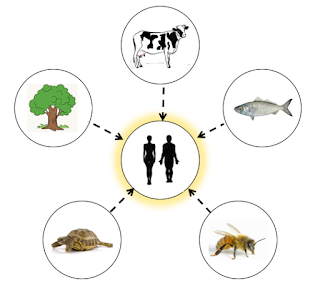No one to blame? Ways of erasing those responsible for environmental issues (Part II)
By Rodrigo Cáceres
In a previous post, we talked about the passivization of sentences as a form of eliminating grammatical agency. In simple words, this means reformulating a sentence so that the subject that carries out the action in a sentence disappears. And then we talked about how this has consequences for present-day environmental discourse and text.
Today I want to introduce you to another possible form of eliminating agency, which is nominalisation. Nominalisation is simply the transformation of a verb into a noun, and it is widely used in day-to-day language.
To give you an example, let's take the verb pollute. In a typical formulation, one would say "X pollutes Y". In this case, "X" is the agent who is responsible for carrying out the action, the polluting. However, one can transform the verb pollute into the noun pollution (thus, a nominalisation). Using the noun pollution in a typical phrase would be something like "Pollution affects Y". As you might notice, "X" was eliminated in this formulation, the agent responsible for polluting Y. Actually, "X" is no longer necessary in the sentence because agency is granted to the noun pollution, so that grammatically speaking, pollution is a subject that acts upon the world. This is false, as it may seem evident, because the noun pollution can exist only because the action of polluting exists, which in turn involves an agent that pollutes (X) and something that is polluted (Y).
The use of nominalisations is quite characteristic of academic and scientific texts, and of course, this is also the case for environmental texts and discourse (Schleppegrell, 1997). We gave the example of pollution, and other popular examples of nominalisations are: Biodiversity loss; habitat loss; climate change; deforestation; ocean acidification; extinction of species; soil erosion, among others. In general, nominalisations have proved to be important means through which environmental researchers have constituted legitimacy and scientific validation (Halliday & Martin, 2003), as well as managed to bring public attention to environmental issues.
However, there are two important problems that arise from using nominalisations. Firstly, whenever scientists or activists put on the table environmental problems in the form of nominalisations, those responsible for the problems are absent. This happens because, as we already know, the causal agent was suppressed when the nominalisation was effectuated. To make it a bit clearer, let's use our previous example of pollution to tell a little story:
After several years of gathering and analyzing data on the deteriorating state of "Y", a group of researchers and environmental organizations managed to raise to government officers the problem of pollution and its consequences for "Y". Several more years had to pass so that public officers and corporations overcame the initial skepticism around the gravity of the problem of pollution. At some point, civil society became aware of the issue and took part actively protesting against pollution. In response to this, government officials and media figures started a fierce debate around the question of "What should we do in order to limit pollution?"
If you've followed the story, you would probably notice this: Where on earth is "X" in this story...?! The X who is responsible for polluting Y...? Well, "X" was completely erased in the way the problem was framed. I claim that this form of framing environmental issues is dominant, that the erasure of causal agents is omnipresent in the current ways environmental discourse is framed in journalism and scientific articles.
Secondly, nowadays more and more people are protesting for nominalisations. In other words, increasing numbers of civil society are now protesting for the climate, biodiversity loss, air pollution, etc. as separate problems. This is not problematic in itself, however, if one knows that all these nominalisations are actually consequences of more systemic causes, such as conceptualizing nature as a resource or political-economic institutions such as capitalism and its fundamental striving for profit accumulation, then these might be the actual "X" in our grammar equation that should be discussed and protested against. Ultimately because protesting independently for the climate, deforestation, etc. may just not be aiming at the ultimate causes of current environmental problems.
Secondly, nowadays more and more people are protesting for nominalisations. In other words, increasing numbers of civil society are now protesting for the climate, biodiversity loss, air pollution, etc. as separate problems. This is not problematic in itself, however, if one knows that all these nominalisations are actually consequences of more systemic causes, such as conceptualizing nature as a resource or political-economic institutions such as capitalism and its fundamental striving for profit accumulation, then these might be the actual "X" in our grammar equation that should be discussed and protested against. Ultimately because protesting independently for the climate, deforestation, etc. may just not be aiming at the ultimate causes of current environmental problems.
References
Schleppegrell, M. J. (1997). Agency in environmental education. Linguistics and Education, 9(1), 49-67.
Halliday, M. A. K., & Martin, J. R. (2003). Writing science: Literacy and discursive power. Routledge.





Comments
Post a Comment